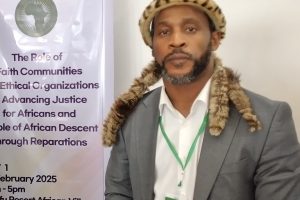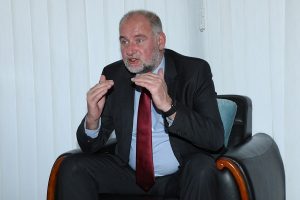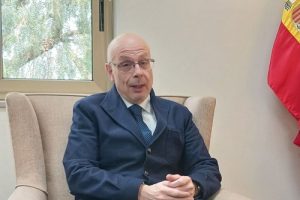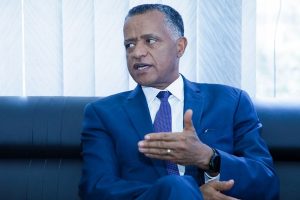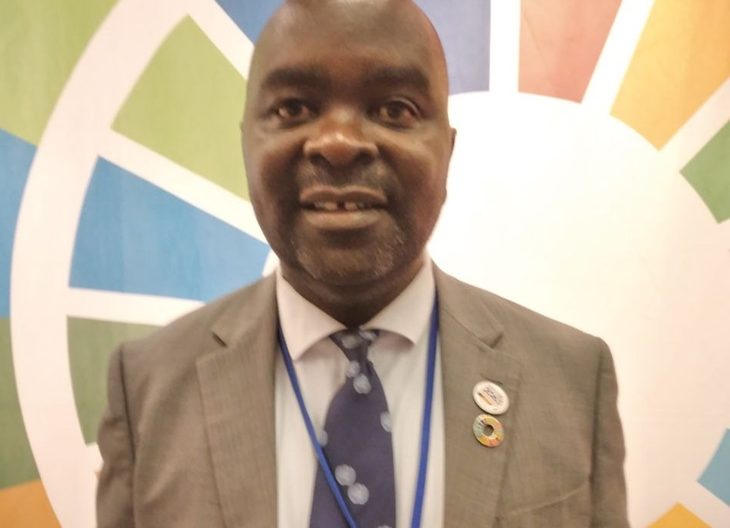
As per the Agenda 2063, the Africa We Want initiative, the African Union (AU) member states align their development plans with the aspirations or goals indicated in it. Still, African countries are member states of the United Nations and are expected to apply the goals under the Sustainable Development Goals (SDGs) or Agenda 2023. How are the member states pursuing their national development plans in line with the two regional and global initiatives?
Frederick Mugisha (PhD) is SDG Integration Advisor to the United Nations Development Program (UNDP) Regional Service Center for Africa, here in Addis Ababa. Mugisha leads UNDP efforts to integrate SDGs and African Union Agenda 2063 across the continent. He supports the design and domestication of the Second Ten-Year Implementation Plan of Agenda 2063, working with and in partnership with UNDP Country Offices.
Before this assignment, he worked with UNDP in South Sudan, Ghana, Eritrea and the Gambia as the Economic Advisor. He also worked with Uganda’s Ministry of Finance and Economic Planning, UNFPA Uganda, Makerere University in Uganda, and African Population and Health Research Center in Kenya among others.
Mugisha holds a Bachelor of Statistics from Makerere University in Uganda, a Masters in Health Services Research from Erasmus University in the Netherlands, a Master’s in Business Administration from Moi University in Kenya, and a PhD in Economics from the University of Heidelberg in Germany.
The Ethiopian Herald had a brief stay with Mugisha on the sidelines of the 10th African Regional Forum on Sustainable Development, which took place from 23 to the 25th of April 2024 here at the UNECA, Addis Ababa. Enjoy an excerpt from his exhaustive explanations.
Could you tell us the overall review of the SDGs, especially Africa’s endeavour?
I think it is not only Africa. It is at a global level that we are having a problem of achieving the SDGs. Last year during the SDG summit only 15% of the targets were well on track. Some had reversed. If we think about Africa, I think the biggest challenge that Africa has is related to SDG 8, jobs. We have also a problem with having clean and affordable energy; we also have a problem with life on the land which is SDG 15.
It is not that we don’t recognize that. If you look at all the development plans and of Africa, including the one of Ethiopia and you analyze them there are 3 things that they prioritize: 1 job, 2 is industry 3 is responsive of government, public services. So, it is not we don’t know, but what we are struggling with as a continent is that we don’t get the right information to use it in the right way. I’ll give you an example.
I want you to tell me whether there’s any country in Africa, you know, that counts the number of jobs they have created every month. None. It’s quite our biggest challenge that we need to address. So if you don’t know how many jobs you have created, and from which sectors how will you be able to create jobs in other sectors? It will be very difficult to prioritize. But we have this information. It’s not that we don’t have it.
Every year, every month businesses submit their tax returns to the tax authorities. And in that, they list the number of jobs, the number of people they have employed because of the pay. Yet we are not using that information to create transformation. And that is a big challenge; so you can realize it’s not that we are not progressing. It is also because we are not doing the right things for us to help us progress. There’s a problem of making sure that we have implemented the plans effectively.
How is UNDP working to address this problem in the future?
The good news is that UNDP looks at it holistically. We were given by member states the opportunity to look at development holistically and make sure that we integrate this across the different sectors whether it is governance, poverty, or environment, we all bring them together and we have gotten this instrument called growth and plan which is an integrated tool/instrument.
UNDP is doing the following things to help accelerate this process. Number 1 is supporting National governments and local governments to improve things that are related to development. For example “How do you design and Improvement development plans?” “How do you establish the right governance so you can achieve this? How do you make sure you take advantage of the environment so that you protect the environment and take the communities forward? How do you make sure that this growth/ development is inclusive? So we are doing that with the partners to make sure that we support the member states to do exactly that.
Are there countries that you can mention as having an exemplary performance? What are they doing?
Rwanda is a good example. They have what they call Immihigo. In Kinya Rwanda this means “This is my commitment” If I don’t fulfil that commitment, there are consequences. Every so often they go and say “You promised you would do this. Have you done that?” You should do this. Have you done?
They agree that “These are our priorities” and everybody has to fit into those priorities. So that is an example. There are less well-documented examples too like in Ethiopia. When coordination is happening, they make sure that we coordinate around achieving the priorities of the government of Ethiopia. Eswatini is also an example. All I’m trying to say is that if you look you can’t fail to get the good examples. But we just have to look enough and bring those examples to the right light so that they can be shared and we have to move the continent together.
One of the major activities of UNDP is focusing on democracy, governance and justice issues. How do these topics really or in this development issues? And how do they affect development?
When you talk about governance, we are talking about SDG 16. And one of the critical elements in SDG 16 is Target 16.6 which talks about the responsiveness of Public Services. Whether that responsiveness is in the elections, whether it is in roads, justice and the rule of law, all ideas of governance are very important. So what we do at the moment is support elections, peace, justice and the rule of law. We support public administration to make sure that civil servants there to have the right capacities for them to move their agenda. And we do this not only in SDG 16 but also in aspirations, 3 and 4 of the African Union Agenda 2063 which is peace and governance.
How do you evaluate the activity or the contribution of the member states in Europe? What do you think are the challenges?
So let me say that If you look at it in a Time Horizon, long time, we are doing well. There are bumps like the recent change of government. But in the sense we have done a good job over time partly because maybe because of the internet but for example voice is much more than it has been at any one time.
Government being responsive to citizen’s needs is better than it has been for a very long time. So I would say we are in the right direction. Can we do more? Probably! Because what we say is now like voice, like responsiveness or developments is not the same across the board. Even within the same country, you may find that some States regions, Districts counties are doing better than others. And what is important for me is that as we deal with these things we have to keep an eye on the progress we are making just to make sure that we know we are making progress and where we are not making progress. We can help people learn from where the progress is being made.
In interconnecting SDGs and Agenda 2063, could you tell us what it means and how the integration of the two grand goals is progressing so far?
UNDP is part of the technical working group on Agenda 2063. Now we have been supporting the articulation/formulation of the plan for the second decade. This plan was approved by the heads of state in February at the AU Summit. That’s a very good milestone.
But one important thing that the leaders of Africa said is that they want to implement Agenda 2063 and the SDGs together using the same systems. The Executive Council’s decision says that they want member states to domesticate Agenda 2063 alongside the SDGs.
In many countries now, the coordinator of SDG is the same coordinator with Agenda 2063. So many countries have one coordination mechanism. Uganda is one of them. The second is that we have had the Africa Report on Sustainable Development. They have now agreed since last year, but they are going to do 1 report for the 2 agenda.
Finally, for me whenever you are addressing maternal mortality or putting some more jobs is number 1 in Agenda 2063 and it is goal number 8 in SGD, but they indicate the same thing. In some countries what they have done and which we are supporting is that if you have 1 indicator, which is the number of jobs, then you indicate which of the SDGs goes to the targets and which of the agenda 2063 Target again. The point is that we deal with an issue be it in the SDGs or Agenda 2063 it’s the same issue. It is opening up Agenda 2063 in ways that we could not imagine. For example, almost all country development plans now refer to Agenda 2063 and Agenda 2030.
About the implementation of one of the Flagship projects of Agenda 2063, the AfCFTA how do you integrate the indicated goals in the SDGs?
African Continental Free Trade Area in SDG is in Goal 17 which is looking at trade. However, within the African Union, the FTA is one of the continental frameworks that help implement Agenda 2063. So in your mind’s eye, the way the second ten-year implementation plan is structured is that you have interventions; then there are 3 Pathways. One of the pathways is the Continental framework. And one of the Continental Frameworks is the FTA. That is how we can get the 7 Moon shots in the second 10-year plan.
How do you see the commitment of member states in taking the right steps to realize AfCFTA?
So first of all, it was ratified by all countries, except Eritrea. Number 2 countries have developed countries strategies for FTA and how they are going to deal with that. And number 3, countries could invest in operationalizing that particular one of the things that I have to say though is that its effectiveness will be made more if other things are also bad. Like for example free movement of people. Some countries are removing visa restrictions like Rwanda and Kenya; We are very grateful, but we need more.
The second is the Single African Air Transport Market (SAATM), which is about the cost of flying from Accra to Lome three times the cost of flying to Kumasi. But the distance between Kumasi and Accra is the same distance from Accra to Lome. The difference is that when you move from Accra to Lome, you are going to another country. If we could get away with making this a single African air space that would be great.
I think we also have a chance because the commodities we trade with each other are similar. We could get to an idea of having “One nation one industry” so that you get one Industry to be headed by 1 one nation and we all support it. For example, Ethiopia Airlines is big. It is in the aviation industry. “If we say Ethiopia you already do aviation. Why don’t we support you as a continent so you can be our leader in aviation?” Then we can go to Kenya. Then “Kenya you are good in hospitality. Why don’t you lead it? Not only in time in terms of training, in terms of standards and so on. We can go to Botswana for mining. There are enough industries to go around. Then the region will work very effectively.
How acceptable do you think would this plan be among member states? What do you expect from them as a response?
I have hope, some things have already been done and we have been doing them since different countries are stronger in those areas and if additional support can be given to them so that they focus that will be great.
Africa is already suffering due to climate change though it does not contribute to it significantly. What’s UNDP doing in helping Africa to cope with this global threat?
Climate change has many dimensions. If you go to South Sudan, you’ll find that conflicts are being fought because of cows moving for water. There is a conflict there. If you see rain now in Nairobi, it’s terrible. Like in this city when it’s real rains it’s a big problem. Now we are doing many things. Some of them are to deal with mitigation if it happens, how do we help? Some are dealing with prevention. How do we make sure that we grow more trees and so on to make sure that this doesn’t happen? But I think even as we do those. I sense that we may have sufficient technology right now to make sure that the impact of climate change is not as bad. For example, we produce food. Food in Uganda is a lot. But in other parts of Africa, it’s not. There has to be a mechanism that we can also use trade to move food.
The way we designed our houses to design our roads there are many aspects that you can think about. So we are doing a lot in support, especially for the Nationally Determined Contributions (NDCs).
Now the first round is finishing they are planning the next, we are already doing a lot of supporting them. But I think It is not just 1 institution. It is a masted effort across several players. What is the design of houses and all this? Well, it has to go with those dealing with conflict, where it has to do that thing a disaster risk reduction. Everybody has space when it comes to climate action including jobs like green jobs.
How does UNDP work with African countries in ensuring food security?
We can ensure food security in many ways. It doesn’t have to be one way. You can do science and technology food. But you can also do science and technology, jobs and then food.
So if you do jobs then cash and then they can buy. UNDPs work concerning food is real to help governance mechanisms for food; increasing goods for food, climate action for food, disaster risk reduction for food, technologies, and jobs. So our contribution is largely indirect in the sense that we provide the platform, the mechanism that allows food security.
So is there anything that you’ve observed from your intervention from this so in like the technology?
There are quite a lot. For example, in South Sudan, we know that food can be a problem. So through community security, we ask how we ensure community security; then buy some tractors for agriculture as a mechanism for food security.
People are grateful when it comes to food processing, like fish how do you make communities work together? Have a junior Factory that helps them process food. You are helping them with social cohesion. But it brings about food security.
Empowering women is an integral part of governance and everything. So what has been the approach especially this this First of all, gender is one of our 8 signature solutions. We believe that empowering women is very critical for the transformation of the continent. We have a few programs with the most one that I would like to say is the gender signal.
So we want this government, now present with the private sector UNDP country offices to get specific results so they can either be graded as Gold, or Silver, through the gender seal gaining the private sector. And with that, we want to have been able to see that first of all many countries are increasingly embracing the idea of having a gender certification that allows them to show their credentials their actual supporting gender and women empowerment. One of the criteria for gender certification is the number of staff that you have men and women.
Thank you for your time
Thank you
BY ZEKARIAS WOLDEMARIAM
The Ethiopian herald May 4/2024


